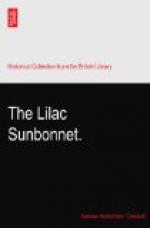“I have not quite finished,” said Ralph, looking a little strangely at the minister.
“You ought always to finish one subject before you begin another,” said Mr. Welsh, with a certain slow sententiousness.
By-and-bye Ralph got away from the table, and in the silence of his own room gave himself to a repentant and self-accusing day of study. Remorsefully sad, with many searchings of heart, he questioned whether indeed he were fit for the high office of minister in the kirk of the Marrow; whether he could now accept that narrow creed, and take up alone the burden of these manifold protestings. It was for this that he had been educated; it was for this that he had been given his place at his father’s desk since ever he could remember.
Here he had studied in the far-off days of his boyhood strange deep books, the flavour of which only he retained. He had learned his letters out of the Bible—the Old Testament. He had gone through the Psalms from beginning to end before he was six. He remembered that the paraphrases were torn out of all the Bibles in the manse. Indeed, they existed only in a rudimentary form even in the great Bible in the kirk (in which by some oversight a heathen binder had bound them), but Allan Welsh had rectified this by pasting them up, so that no preacher in a moment of demoniac possession might give one out. What would have happened if this had occurred in the Marrow kirk it is perhaps better only guessing. At twelve Ralph was already far on in Latin and Greek, and at thirteen he could read plain narrative Hebrew, and had a Hebrew Bible of his own in which he followed his father, to the admiration of all the congregation.
Prigs of very pure water have sometimes been manufactured by just such means as this.
Sometimes his father would lean over and say, “My son, what is the expression for that in the original?” whereupon Ralph would read the passage. It was between Gilbert Peden and his Maker that sometimes he did this for pride, and not for information; but Ralph was his only son, and was he not training him, as all knew, in order that he might be a missionary apostle of the great truths of the protesting kirk of the Marrow, left to testify lonely and forgotten among the scanty thousands of Scotland, yet carrying indubitably the only pure doctrine as it had been delivered to the saints?
But, in spite of all, the lad’s bent was really towards literature. The books of verses which he kept under lock and key were the only things that he had ever concealed from his father. Again, since he had come to man’s estate, the articles he had covertly sent to the Edinburgh Magazine were manifest tokens of the bent of his mind. All the more was he conscious of this, that he had truly lived his life before the jealous face of his father’s God, though his heart leaned to the milder divinity and the kindlier gospel of One who was the Bearer of Burdens.




